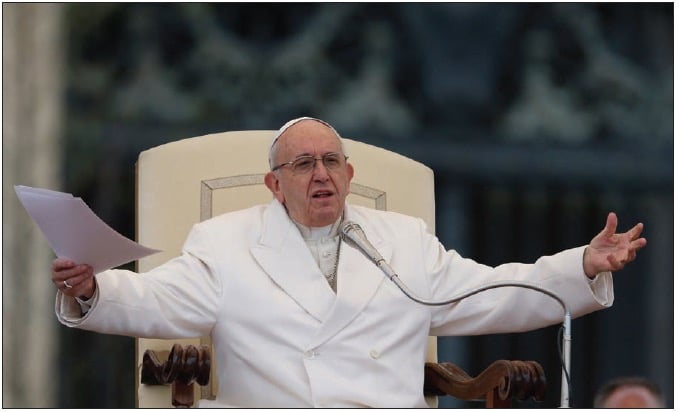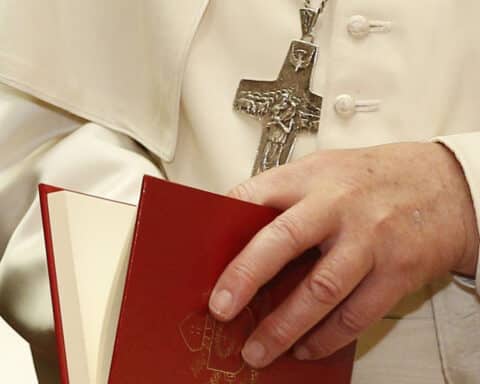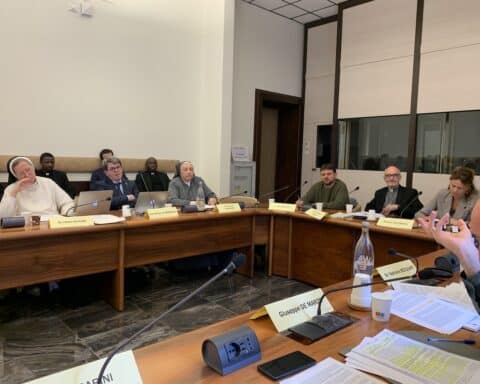Pope Francis released the newest contribution to his magisterium April 9: a document on the call to holiness in today’s world. The text, called “Gaudete et Exsultate” (“Rejoice and be glad”), was signed on March 19, the feast of St. Joseph.
“Gaudete et Exsultate” is published in the form of an apostolic exhortation, a form of papal document that has been used most frequently in the current pontificate and has become known for its more subjective style. Before “Gaudete et Exsultate,” the most recent apostolic exhortation released was the controversial “Amoris Laetitia” (“The Joy of Love”), which was published in 2016 as the result of the 2014 and 2015 synods on the family.
The goal of the new apostolic exhortation, Pope Francis writes, is not to be “a treatise on holiness, containing definitions and distinctions helpful for understanding this important subject, or a discussion of the various means of sanctification.” Rather, the Holy Father seeks “to repropose the call to holiness in a practical way for our own time, with all its risks, challenges and opportunities” (No. 2). The first chapter reiterates the teaching of the Second Vatican Council — more specifically in “Lumen Gentium,” the Dogmatic Constitution of the Church — on the universal call to holiness.
The ‘middle-class of holiness’
While the Church has long held up models of Christian life in beatified and canonized persons, the pope reiterates that these extraordinary models of holiness do not alone constitute the communion of saints. To emphasize the universal call to holiness, the pope makes a sincere, pastoral and personal effort to reiterate that holiness is found in the ordinary circumstances of life.
In this regard, the pope draws attention to what he calls “the middle class of holiness,” where he finds “daily perseverance” and “patience” as manifestations of the one call to holiness. Ultimately, these and the many other manifestations of holiness in the communion of saints are grounded in the call to love, “We are all called to be holy by living our lives with love and by bearing witness in everything we do: wherever we find ourselves” (No. 14). Or as Pope Benedict XVI said (as quoted by Pope Francis) “holiness is nothing other than charity lived to the full.”
The pope focuses on a line from “Lumen Gentium” that speaks about how the saints answer this call “each in his or her own way.” He cautions against merely trying to copy the saints, but urges us rather to fulfill the unique call that the Lord has given us.
Characteristics of holiness
‘While the pope acknowledges that holiness comes in all shapes and sizes, he proposes some basic characteristics that form its foundation: growth in holiness through consistency and dedication in small gestures in daily human life and relations (No. 16); imitating the self-sacrificial love of Christ (No. 20); and reflecting Christ to the world by living our lives as a mission (Nos. 19-24).
In answering our own call to be holy, we must employ discernment, the pope says. He describes discernment as “a gift which we must implore” and “seek to develop it through prayer, reflection, reading and good counsel” (No. 166). The pope says that discernment especially is needed today more than ever because “contemporary life offers immense possibilities for action and distraction, and the world presents all of them as valid and good” (No. 167). Discernment also will help us to know when we are truly following the will of God, as opposed to the ways of the world or falling prey to the devil — against whom the pope strongly cautions and urges vigilance. (This section is particular noteworthy given the uproar during Holy Week when the editor of an Italian newspaper claimed that the Holy Father, in a personal conversation, denied the existence of hell.)
Ultimately, the pope does not want the faithful to find the call to holiness to be daunting or something to be afraid of, but rather to see it as the reason for which we are made and where we will find true joy. He echoes French novelist and poet Leon Bloy who wrote, “the only great tragedy in life, is not to become a saint.”
‘A Christian’s identity card’
One of the document’s hallmarks — indeed, even the source of its title — is found in its lengthy discourse on the Beatitudes, from Jesus’ Sermon on the Mount, which the pope calls “a Christian’s identity card” (No. 63). They present us with a portrait of Jesus, the pope says, “which we are called to reflect in our daily lives” (No. 63).
The document incorporates many themes that have become trademarks of Pope Francis’ papacy, including an emphasis on the importance of finding God in our neighbor, particularly in those on the margins of society, and the dangers of consumerism and technology. He also highlights a greater role for mercy in answering the call to holiness.
The pope also offers “five great expressions of love for God and neighbor” considered to be particularly relevant in today’s world: perseverance, patience and meekness; joy and a sense of humor; boldness and passion; communal living; and constant prayer.
Enemies to holiness
The document also includes a chapter on what the pope calls “two subtle enemies to holiness” that he finds present in the Church today: Gnosticism and Pelagianism. He says it is problematic when a person “has an answer for every question” (No. 41), and he critiques those who he believes stifle the life of the Church by “a self-centered and elitist complacency, bereft of true love.” The pope does not indicate directly in whom he believes these problems fester today, but many undoubtedly will perceive these comments as an indirect response to his critics, who have grown increasingly vocal since the release of Amoris Laetitia in 2016.
Though the text likely won’t engender the same amount of commentary as Amoris, critics may hone in on two primary points. In his effort to encourage all to holiness, Pope Francis opts not to emphasize the traditional identifiers of sanctity, such as heroic virtues, but rather positions holiness within the context of small steps that individuals can take in daily life to become better people. Some may object to this shift.
Second, Pope Francis advocates for the “seamless garment” approach to moral and ethical issues, wherein he notes that the worldwide immigration crisis is just as evil as various bioethical crises.
“Our defense of the innocent unborn, for example, needs to be clear, firm and passionate, for at stake is the dignity of a human life, which is always sacred and demands love for each person, regardless of his or her stage of development,” the pope writes. “Equally sacred, however, are the lives of the poor, those already born, the destitute, the abandoned and the underprivileged, the vulnerable infirm and elderly exposed to covert euthanasia, the victims of human trafficking, new forms of slavery, and every form of rejection. We cannot uphold an ideal of holiness that would ignore injustice in a world where some revel, spend with abandon and live only for the latest consumer goods, even as others look on from afar, living their entire lives in abject poverty (No. 101).





